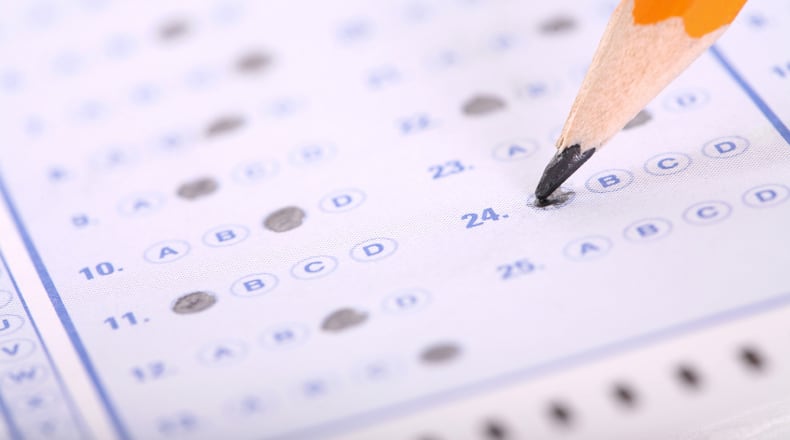Georgia students did better on the ACT this year and more of them took it, a byproduct of wariness toward the revamped SAT that rolled out in March and the growing trend to take both college admission tests.
According to the Department of Education, Georgia’s average composite score of 21.1 was higher for the first time ever than the national average of 20.8. A 36 is the highest score possible on the test, which includes math, science, reading and English.
I have seen a real push toward the ACT by Georgia test prep companies, which were not yet schooled on the new SAT and thus encouraged students to take the ACT. When I was in school in the northeast, most kids took the SAT once or twice. Today, many more kids try both and multiple times.
FairTest spokesman Bob Schaeffer noted the ACT is now used in 20 states as the annual exam to satisfy federal testing requirements, which helps explain the rising number of test takers. "However, colleges and universities increasingly recognize that ACT scores are neither accurate nor fair measures of higher education readiness. That's why so many admissions offices recently dropped testing requirements," he said
While many schools have made the SAT or ACT optional, Georgia's top public campuses and most elite colleges still rely on them in their admission considerations. Clearly, those schools see a value in the tests even though high school grade point average has been shown to be a better indicator of both college performance and completion.
While the average Georgia student scored a 21.1 on the ACT, freshmen starting the University of Georgia this month had ACTs in the middle 50 percent range of 27 to 32. Georgia Tech's range was 30 to 34.
(I sent the University of Georgia and Georgia Tech a set of questions about their admission policies and will run them as soon as I get them.)
One interesting note: My local high school meets with parents of seniors in groups of five to discuss college applications. I had that meeting this week. When asked about the ACT score needed for Tech, the counselor said Tech wants applicants to score in the 30s -- a 36 is perfect -- but does not really distinguish between a 32 or a 33. He said there was no percentage in students chasing after one more point on the test.
Any of you agree?
Here is the celebratory release from the state Department of Education on the ACT performance:
Georgia's average composite score of 21.1 was higher, for the first time in state history, than the national average of 20.8. Georgia outperformed the nation in English, reading, and science as well, and scored the same as the national average in mathematics.
Taking a wider look, Georgia's ACT rank has continued to improve relative to other states: this year, our students outperformed 26 other states and tied with one. That's an increase from 2015, when Georgia ranked 28th in the nation, and 2014, when it ranked 30th.
"Georgia students are outpacing the nation on the ACT, even as more of our high schoolers take the test," State School Superintendent Richard Woods said. "This reaffirms one of the core goals of our strategic plan, to increase the percentage of high school graduates who are college and/or career ready. It is also a testament to the hard work of our students and teachers, and to the collaborative efforts that are advancing child-centered, classroom-focused policies in the state of Georgia. Conventional wisdom holds that as more students take a test like the ACT, scores will go down – but our Georgia students proved that's not always the case. I'm immensely proud of them all."
Georgia had 58,073 ACT test takers in 2016, compared to 54,653 in the graduating class of 2015 – a 5.9 percent increase. Since 2012, the number of ACT test takers has increased by more than 10,000 students, from 47,169 in 2012 to 58,072 in 2016.
Georgia students' average composite score rose from 21 in 2015 to 21.1 in 2016, with most subject area scores increasing as well: from 20.6 to 20.7 in English, 21.6 to 21.8 in reading, and 20.9 to 21 in science. The score for mathematics held steady at 20.6.
This year, Georgia graduates who took advanced levels of science showed higher levels of achievement than the national average. Students who took advanced science courses of biology, chemistry, and physics had an average ACT science score of 23.2. The national ACT science score for students who took the same sequence is 23. And Georgia's average ACT STEM score has eclipsed the national STEM score for the first time in five years, increasing by 0.2 point. Georgia has focused on STEM certification for K-12 schools, recognizing schools that offer an integrated, project-based curriculum and incentivizing a solid foundation in STEM for Georgia's students.
ACT is also providing, for the first time, an indicator of career readiness based on ACT composite scores. Progress toward career readiness is based on research linking ACT composite scores to levels on ACT's National Career Readiness Certificate (NCRC). In Georgia, 72 percent of ACT-tested graduates are considered to be making progress toward at least a gold NCRC level, compared to 68 percent nationally. Georgia's Career, Technical, and Agricultural Education program has seen broad success, including a 94.9 percent graduation rate in 2015.
In addition to a rising composite score, the percentage of students meeting the ACT College Readiness Benchmarks increased in ALL subject areas: from 64 to 65 percent in English, 38 to 40 percent in mathematics, and 46 to 47 percent in reading. Science stayed the same at 36 percent, but increased by 1,231 students. The Benchmarks are scores on the ACT subject-area tests that represent the level of achievement required for students to have a 50 percent chance of obtaining a B or higher, or about a 75 percent chance of obtaining a C or higher, in corresponding credit-bearing first-year college courses.
2016 ACT results also brought positive news in the area of equity. Georgia's two largest minority groups, African Americans and Hispanics, had greater representation on the ACT and their average composite scores increased. The average score for African American students increased from 17.6 in 2012 to 18 in 2016, while the number of test takers grew by 2,215 during the same period. The average score for Hispanics increased from 19.9 in 2012 to 20.2 in 2016, while the number of test takers grew by 1,683 in the same period.
About the Author





